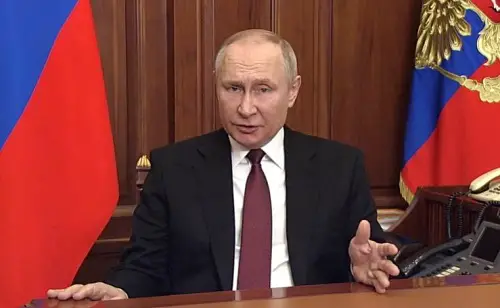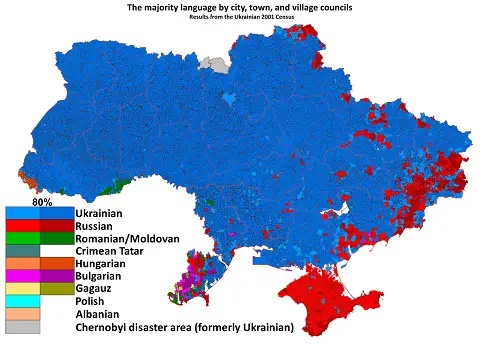|
TRANSLATE THIS ARTICLE
Integral World: Exploring Theories of Everything
An independent forum for a critical discussion of the integral philosophy of Ken Wilber
  Frank Visser, graduated as a psychologist of culture and religion, founded IntegralWorld in 1997. He worked as production manager for various publishing houses and as service manager for various internet companies and lives in Amsterdam. Books: Ken Wilber: Thought as Passion (SUNY, 2003), and The Corona Conspiracy: Combatting Disinformation about the Coronavirus (Kindle, 2020). Frank Visser, graduated as a psychologist of culture and religion, founded IntegralWorld in 1997. He worked as production manager for various publishing houses and as service manager for various internet companies and lives in Amsterdam. Books: Ken Wilber: Thought as Passion (SUNY, 2003), and The Corona Conspiracy: Combatting Disinformation about the Coronavirus (Kindle, 2020). Part 6 | Part 7 | Part 8 | Part 9 | Part 10 
Vladimir Putin has tried to justify the war on Ukraine with false claims (dw.com)
Putin's rationalization of the Ukrainian invasionAnother reply to Joseph DillardFrank VisserAbstract by ChatGPT. Frank Visser critiques Putin's reasons for invading Ukraine. Putin cited threats from Ukraine and NATO, seeking Ukraine's demilitarization and denazification. However, Deutsche Welle fact-checked and refuted these claims: Ukraine's 'denazification' need is false, NATO's advancement on Russia's border is misleading, Russia's defense claim under the UN Charter is false, and the 'genocide' claim in Ukraine is false. Visser highlights Russia's history of revisionism and stresses the need for an unbiased view on the Ukraine crisis, emphasizing its complexity and urging against further escalation. "NO OTHER OPTION"
I fully agree that we should transcend our black-and-white views of the current Ukraine crisis, but this includes Putin's own black-and-white analysis.
In his address to the nation on February 24, 2022, Putin gave his arguments to justify his "special operation"—the invasion into Ukraine[1]. Here's a short fragment: The course of events and the incoming information show that Russia's clash with these forces is inevitable. It is only a matter of time: they are getting ready, they are waiting for the right time. Now they also claim to acquire nuclear weapons. We will not allow this to happen. To summarize the argument: because Russia and its people is threatened by Ukraine (and NATO), it needs to be demilitarized and denazified, and this is in accordance with the UN Charter. Let's unpack this line of reasoning in more detail. "Misleading and false"Exactly one day after Putin's speech, the German news medium Deutsche Welle (DW) did a fact check of some of his core claims.[2] 
I am paraphrazing below from this thorough fact check, but do read it for yourself in fuller detail. Does Ukraine need to be 'denazified'?"Denazification" was a term used in post-war Germany to get rid of its Nazi elements. The comparison with Ukraine is "out of place". Though there definitely are Neo-Nazi groups in Ukraine, there political impact is minimal (though their military impact is substantial, given their anti-Russian sentiments). It has often been remarked, that president Zelensky is a Russian(!) speaking Jew(!). More importantly, the Jewish community (the Auschwitz Museum and the US Holocaust Museum) strongly condemned these comparisons to Nazism.
Were NATO troops advancing on Russia's border?Many former communist Eastern European countries joined NATO, and NATO has made military arrangements in these countries, but they did this after Russia's annexation of Crimea, which was illegal under international law. The troops located in these countries is far too small to pose a threat to Russia. Russia has been offered the opportunity to verify that no cruise missiles were posted in these areas, but it has refused this offer. (Bear in mind that Ukraine once possessed many nuclear missiles after the Soviet-Union ended, but gave these up under the condition that its borders would be respected—go figure.) Is Russia's attack a defense case under the UN Charter?
Article 51
Nothing in the present Charter shall impair the inherent right of individual or collective self-defence if an armed attack occurs against a Member of the United Nations, until the Security Council has taken measures necessary to maintain international peace and security. (un.org) Russia was not under attack, so the collective self-defence argument does not apply. Nor were the two independent Donbas republics UN member states. Very few countries recognize these self-proclaimed republics. "The Donetsk and Luhansk People's Republics have only received international recognition from each other (between Donetsk and Luhansk People's Republic, respectively), from Russia, Abkhazia and from South Ossetia." (Wikipedia). Besides, the military response by Russia was disproportionate. Was there a 'genocide' in Ukraine?"Genocide" is a controversial term. There was a civil war in the Donbas areas, supported by both Ukraine and Russia. OSCE Special Monitoring Mission to Ukraine which has investigated both sides of the conflict area since 2014 has found no evidence of any systematic killing of civilians. According to the UN High Commissioner for Human Rights' 2021 data, a total of approximately 3,000 civilians have died in the war zone in eastern Ukraine. Most of those deaths occurred early on in the fighting but casualty numbers have been dropping since 2016. Something is definitely wrong or at least one-sided with Putin's "rationalization of the Ukrainian invasion." "Wake Up Out of Group Think"Now, those who sympathize with Putin's stance could easily argue: this is just Western propaganda, you should consult real media such as RT! This state-owned Russian news channel is the voice of Kremlin and Putin, which we have already heard, so we have now covered both sides of the issue. In several essays on Integral World Joseph Dillard has presented the Russian perspective, if only to counterbalance the widely presented Western narrative that sees Putin as the sole aggressor in this conflict.[3] I have responded to that by saying that "taking Putin's own stated perspective of the war into account is one thing, going all the way into the rabbit hole of Russian war propaganda is totally something else, in my opinion."[4] I get the strong impression that Dillard errs to the Russian-perspective side, when he argues extensively how prominent Neo-Nazism is in Ukraine, or how many Russians have been killed in the Donbas area over the years. Not to mention his attempts to deny or minimize the damage done by the Russian army to buildings and civilians, providing us with contrarian news media and information. Or his assurance that he doesn't mention his compassion with Ukrainians for fear of "virtue signaling". I fully agree that we should transcend our group think and black-and-white views of the current Ukraine crisis, but this includes all group think, and a fortiori Putin's own black-and-white analysis. Too often, wars and invasions have been started based on false arguments (as the West should know all too well). Or, as Dillard himself would phrase it, we are all "rationalizing animals": "We all want to justify our violations of social norms and legalities. Robert Heinlein has noted that humans are not rational but rationalizing animals."[3] Russian politicians have a famous habit of rewriting history (revisionism), as long as it makes them look victorious or does not let them feel guilty. There is no firm historical tradition of critically looking at the atrocities of Russian history (during the periods of Stalin and the Soviet Union)—no Historikerstreit as has been the case in Germany for decades—and a wide spread tendency to blame all problems on external factors (the United States, NATO, Ukraine, Neo-Nazis, sanctions, and so on).[5] Nor does Putin particularly seem to care how it felt to be deported by Stalin, to be dominated by the Soviet Union, or to be invaded by Russia. He behaves as if it is his divine right to act.[6] "Defending all Russians", wherever they live, apparently justifies all means to him, including ruining a developing democracy, whose cultural and geographical reality he flatly denies. It should also be realized that these types of conflict are inherited from the Soviet Union policy to move Russians to Soviet-dominated countries. After the fall of the Soviet Union, these populations turned from representatives of the Kremlin to minorities in a country that struggles for autonomy and independence and tries to form its own identity and write its own history. This unavoidably leads to frictions that should wisely be managed. I would not be surprised if these minorities prefer to live in these independent countries, instead of migrating back to Russia. Finding a balanced and integral view of the Ukraine crisis requires zooming out from all partial views, after fully having studied these first. It is a complex and fascinating topic, for which I truly lack the necessary expertise. All I can do is read up on as many perspectives I can manage. For all I know this is a conflict on many levels:
At the same time, this is an escalation path we all want to avoid. Why not ask the Donbas people what they want, or is it now too late for that? But even if Russia "wins" in these areas, the whole area will be divided between Russia- and Ukraine-loyal populations. One thing is clear, a full scale war is not the way to solve this. 
Languages spoken at home in Ukraine, 2009 polling (Wikipedia)
NOTES[1] "'No other option': Excerpts of Putin's speech declaring war", aljazeera.com, Feb. 24, 2022. [2] "Fact check: Do Vladimir Putin's justifications for going to war against Ukraine add up?", dw.com, Feb. 25, 2002. [3] Joseph Dillard, "The Ukraine Crisis: An Opportunity to Wake Up Out of Groupthink", www.integralworld.net, March 2022. [4] Frank Visser, "'Putin has a Point and the West is to Blame'", www.integralworld.net, April 2022. [5] Hubert Smeets, De wraak van Poetin: Rusland contra Europa ["Putin's Revenge: Russia against Europe"], Amsterdam, Prometheus, 2015/2022. Smeets is a Dutch former Russia-correspondent for the large newspaper NRC and co-founder of Raam op Rusland ["Window to Russia"], an online platform for debate on Russia. In this book Smeets writes (p. 254) that already around 2006 several scenarios for "the return of Ukraine" circulated. It looks like Russia is now (26 April 2022) aiming for the first option:
Who knows what other scenarios Putin has in mind? Other countries with Russian inhabitants? [6] Frank Visser, "Putin's Dark Ideology of a Sacred Greater Russia", www.integralworld.net, April 2022.
Comment Form is loading comments...
| |||||||||||||||||||||||||||